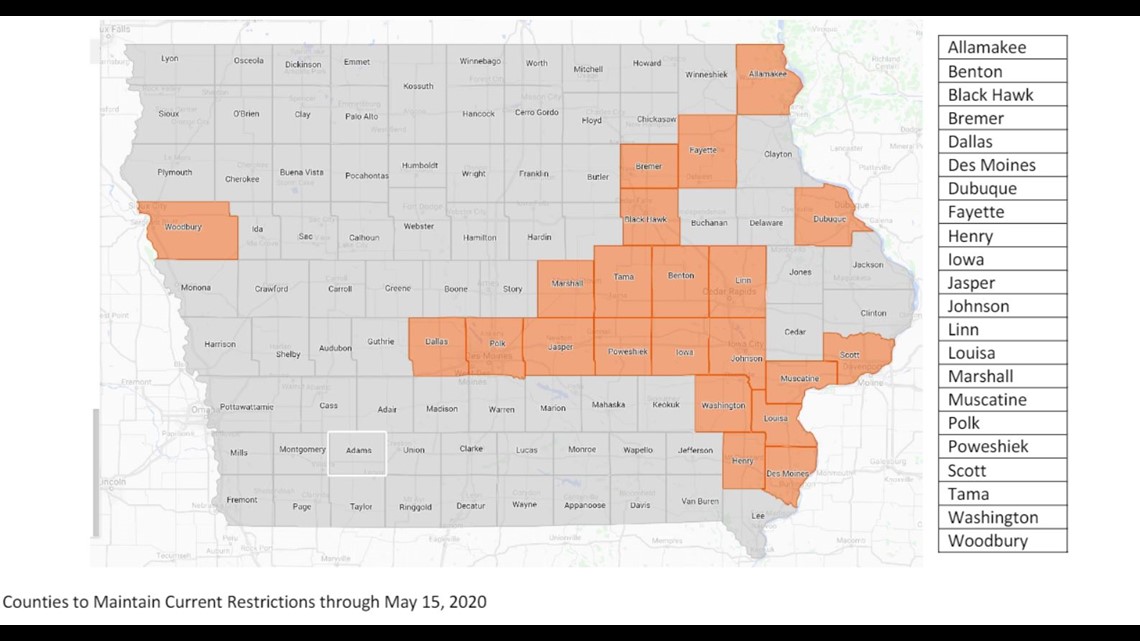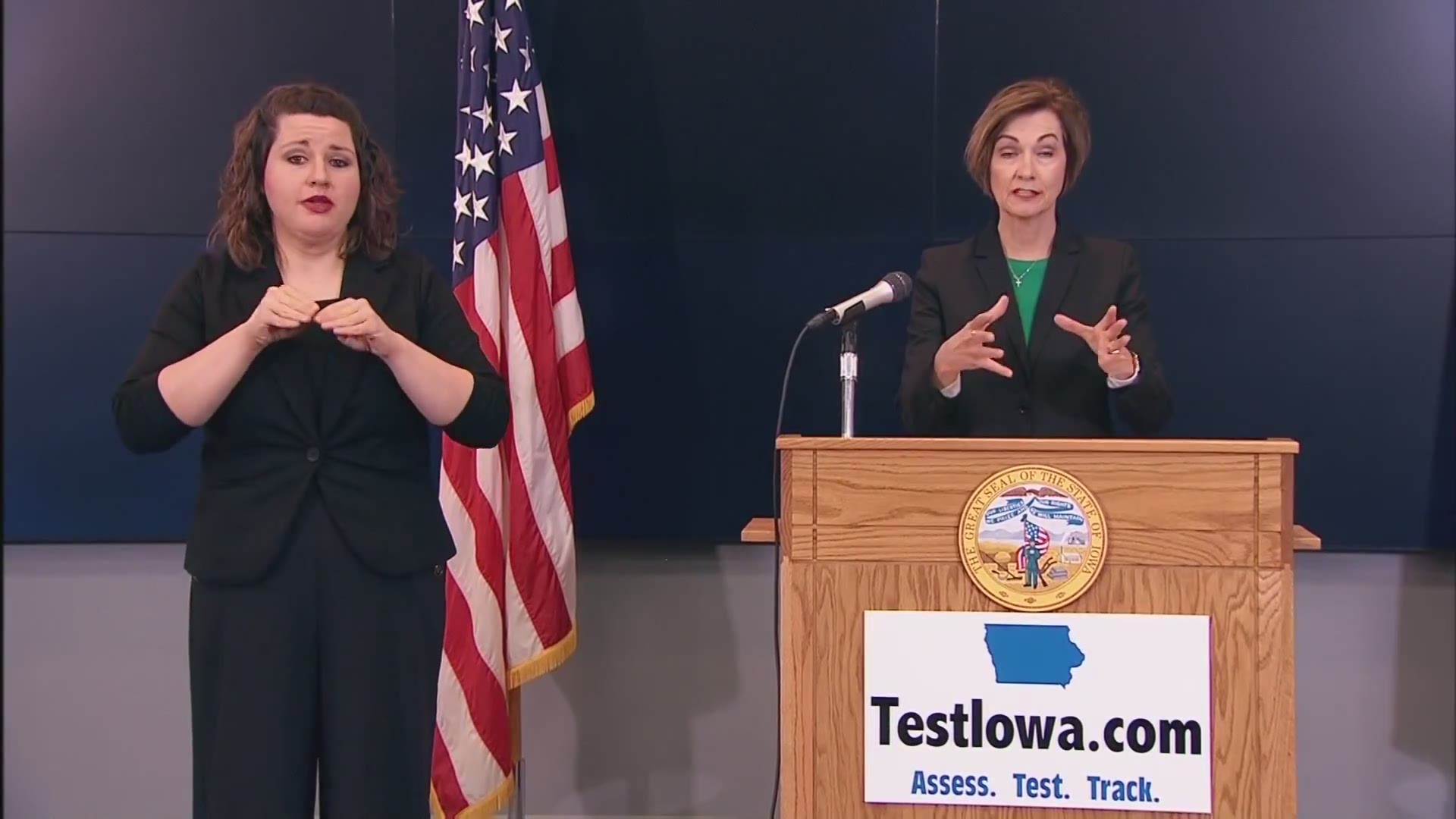IOWA, USA — Text FACTS to 515-457-1026 for the latest coronavirus coverage.
Iowa recorded its highest daily coronavirus death toll Tuesday, with 19 more Iowans reportedly dying from the virus according to the Iowa Department of Public Health.
Gov. Kim Reynolds said despite the rising case totals, she intends to push forward with her plans to reopen the state because, in addition to physical health, she needs to take Iowans emotional and financial well being into account as well.
Local 5 has a recap of what was covered during the governor's daily press conference Tuesday.
Outbreaks at food processing plants
Hundreds of Iowans that work at food processing plants have tested positive for COVID-19, according to Sarah Reisetter with the Iowa Department of Public Health.
"Dr. [Caitlin] Pedati has determined that it is necessary to protect the public health to release the name of an employer when there's been an outbreak," Reisetter said.
An outbreak at a facility is defined as 10% absenteeism or when 10% of the workforce has tested positive or have come into close contact in a single location of an employment setting that "constitutes as a high-risk environment" with the potential of COVID-19 transmission.
Those employment settings include areas where social distancing is either impractical or impossible such as meatpacking plants, food and beverage processing plants, factories with production lines and warehouses.
Five facilities have been confirmed to have outbreaks, according to IDPH.
Tysons Food Inc. has three plants in Iowa with outbreaks:
- Columbus Junction: 221 cases, or 26% of employees tested
- Waterloo: 444 cases, or 17% of employees tested
- Perry: 730 cases, or 58% of employees tested
The Iowa Premium National Beef in Tama has 258 cases, or 39% of employees that have been tested.
TPI in Newton, the fifth facility announced Tuesday, has seen 131 positive cases, or 13% of employee tested.
The total number of workers that have tested positive at these plants is 1,784.
Reisetter said the 10% threshold comes from how the IDPH looks at flu activity in Iowa.
"It's a consistent standard that we apply as we're looking at flu activity throughout the state, and so we ask schools, for example, to report to the department when they have more than 10% of their students out ill," Reisetter said.
WATCH: Gov. Kim Reynolds' full press conference for May 5, 2020
New funding announced for elementary, secondary education
"Spring has brought some unexpected challenges, but I quickly learned that no challenges too great for the administrators, teachers and staff who work in our schools," said Dr. Ann Lebo, director of the Iowa Department of Education.
Lebo praised Iowans for continuing their work while adapting to the sudden changes brought on by the pandemic.
"Now we have financial relief to help," Lebo said.
Iowa has received over $71.6 million in federal funding through the Elementary and Secondary Emergency School Relief Fund. This fund will help Iowa's schools address some of the costs incurred by the COVID-19 pandemic.
Lebo announced that schools will be able to apply for this funding starting Tuesday. The deadline to apply is May 11.
What is a 'strike team?'
To get ahead of virus activity, the state of Iowa has started to deploy strike teams.
Reynolds said strike teams are made up of nurses and are deployed to communities where virus activity is high. Their job is to conduct surveillance testing among employees that work in long-term care facilities or manufacturing facilities.
Teams provide diagnostic and serology testing for these essential workers to identify and isolate positive cases so people that may be asymptomatic don't spread the virus unknowingly. They also track virus activity in the area.
Reynolds also said these strike teams "ultimately create confidence in the safety of the work environment while protecting our most vulnerable populations."
The teams are used as a tool to use for counties with high virus activity.
Unfortunately, the state doesn't have resources to send strike teams everywhere they may be needed in the state.
Tuesday, Reynolds called on counties to partner with IDPH when they feel surveillance testing might be needed.
That's what happened recently in Dubuque County.
Patrice Lambert, executive director of Dubuque County Public Health Department, along with the Dubuque Emergency Operation Center had reached out to IDPH to request a strike team after an outbreak was reported at a long-term care facility.
At the time, every strike team was committed to a different county.
Local public health officials and health care providers teamed up to create a plan for testing. Since they had a plan, the state was able to provide 1,000 tests for local health care workers to conduct targeted testing for the long-term care facility and other special populations.
"Partnerships are how Iowa will get through this pandemic," Lambert said at Tuesday's press conference over the phone.
Are case numbers increasing in the 77 reopened counties?
On April 27, Reynolds signed a proclamation allowing restaurants and retail stores to reopen at 50% capacity in 77 of Iowa’s 99 counties.
The following day, 98% of new cases reported were located in the 22 counties where restrictions remained in place.
Tuesday, that figure dropped to 80%.


The uptick in cases is due to the prevalence of the virus in various settings, according to Reynolds.
"It's in households. It's in congregate settings," Reynolds said. "It's in manufacturing facilities where people work in close proximity."
Daily breakdown of new cases reported in 22 counties with restrictions still in place:
- April 28: 98%
- April 29: 93%
- April 30: 89%
- May 1: 85%
- May 2: 87%
- May 3: 77%
- May 4: 85%
- May 5: 80%
Reynolds said to not look at this "snapshot" of Iowa's current data, but at the trends of virus activity.
"We're trying to look at trends over time, and as you'll see things are starting to even decline on the eastern side of the state because of when they entered into it," Reynolds explained.
"They're starting to trend down and so that's some of the things that we will look at as we move forward," she added, referring to eastern Iowa counties.
Reynolds stressed the need for Iowans to practice social distancing whenever possible. She noted that gatherings of more than 10 are still prohibited at this time.
"People need to be responsible and I believe, and I trust Iowans to do the right thing and I trust our businesses to do the right thing and we're actually seeing that," Reynolds said. "There's more than just the virus. There is the physical, there is the mental well-being and there is the financial well-being, too," she continued, "Iowans are seeing their livelihoods just destroyed."
Emphasizing TestIowa efforts
Tuesday, Reynolds said TestIowa, a program aimed at allowing for widespread testing in the state, is allowing for targeted testing in areas with high case counts.
There are TestIowa sites in Des Moines, Waterloo and Sioux City. Reynolds announced a fourth site will open in Cedar Rapids on Thursday.
"We're fishing where the fish are, so it's no wonder that our daily case counts have grown over the last few weeks," Reynolds said.
Reynolds' administration has been focused on expanding Iowa's testing capacity.
"The fact is, we can't prevent people from getting the COVID-19 virus," Reynolds said. "If we weren't testing in these areas people would still have the virus, and without being tested, diagnosed and isolated, it could spread even further."
Reynolds said going to these highly-active areas and determining its scope within a region or a community gives a better opportunity to contain the virus and learn how we can manage it for the long term.
Tuesday, Local 5 learned how TestIowa swab samples are stored and transported to the State Hygienic Lab.
Reynolds' spokesman Pat Garrett said TestIowa swab samples are stored in a cooler with ice packs. Each site has a large cooler to store swab samples. There are two more coolers used to transport the swab kits to the State Hygienic Lab.
All swabs and coolers are transported to the State Hygienic Lab the same day samples are collected. The state reported no issues keeping swabs cool, transporting them or concerns from the State Hygienic Lab.
Once the swabs arrive at the State Hygienic Lab, they are stored in a deep freezer and kept at -30 degrees. Garrett said swabs can be stored at that temperature for 30 days.
Garrett said that storage and transportation process is FDA approved.
RELATED: Live updates: West Des Moines allocates money for homeless prevention; Iowa COVID-19 deaths at 188
WATCH: Complete coronavirus coverage from Local 5 on YouTube

